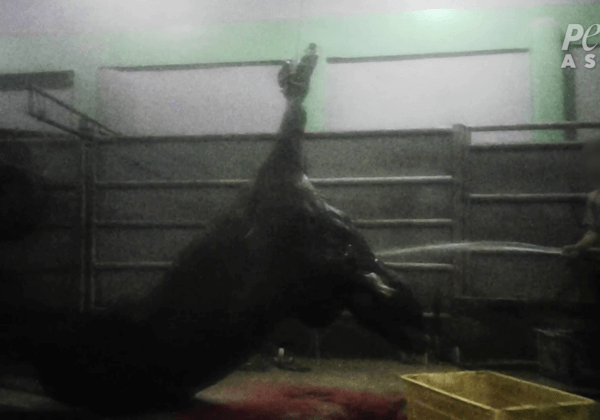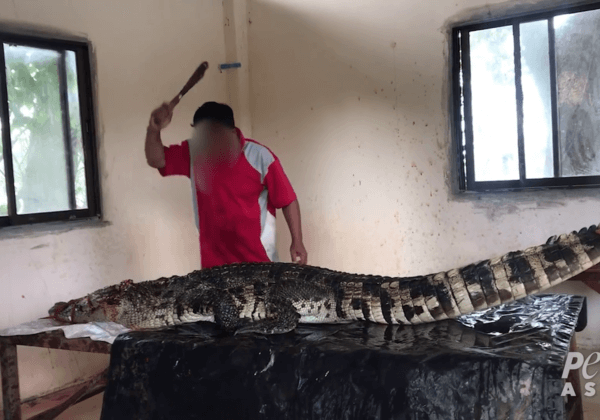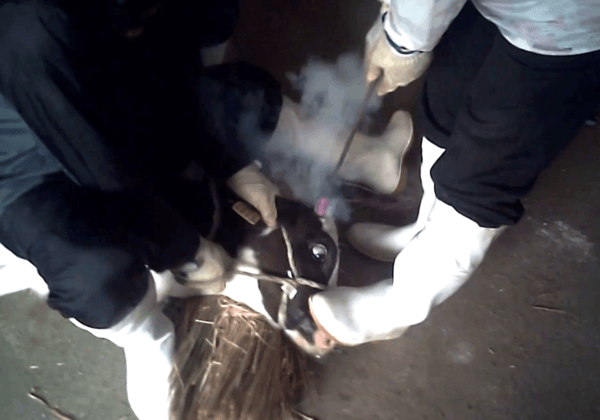Animals Aren’t ‘Freight’: 9 Ways You Can Help Them
Every week, more than a billion live animals are transported worldwide over long distances, through blazing heat and freezing cold—often without food, water, or veterinary care—as if they were nothing more than freight. Their grueling journeys frequently end at a slaughterhouse, where they face a terrifying death. Others end up on pet store shelves or in laboratory cages.
On August 29, caring people around the world will participate in a global day of action against all forms of live-animal transport. The day will mark the 20th anniversary of the world’s worst live-export disaster, when more than 67,000 sheep burned to death or drowned when the ship carrying them across the Indian Ocean burst into flames and sank.
The best way to help animals is never to buy them or their body parts for any reason, but we can also help reduce their suffering by taking action now to improve their transport conditions. Here are nine actions that you can take:
-
Don’t put your animal companions in the cargo hold.

Flying might sometimes seem like the fastest and least stressful option when you travel, but it can turn out to be just the opposite for your animal friends if they’re forced to fly in the cargo hold. Every year, companion animals are lost, injured, or even killed after being flown in aircraft cargo holds. Airline employees sometimes let dogs out of their carriers during layovers—and many are never seen again. Some animals sustain fatal injuries when their carriers are jostled or banged by baggage, and others become lost when carriers are damaged and animals escape. Dogs and cats can be cooked alive when cargo-hold temperatures become deadly in minimally ventilated spaces meant to transport luggage, not living beings. It’s best to keep animals with trusted friends, family members, or sitters during vacations. If you must fly with your animals, find an airline that allows them to fly in the passenger cabin—the lives of your animal companions may depend on it! -
Tell your friends and family about animals transported for food.

Pigs ready to be transported for slaughter in Vietnam.
Let people know that chickens are rounded up by workers who grab them by the legs and sling them into crates for transport, often breaking their fragile bones. All animals transported for food, including cows and pigs, are often deprived of food and water, and the journey to the slaughterhouse may be many hours long, through all weather conditions.
-
Refuse to attend circuses that use animals.
Animals used in circuses are forced to spend most of their lives inside cramped, barren cages and Elephants are kept in leg shackles that prevent them from taking more than one step in any direction, and our investigation in China shows that bear cubs are chained or tethered to a wall and forced to remain upright, sometimes for hours at a time, in order to train them to walk on their hind legs. If they can’t hold themselves up, they risk choking and hanging themselves. Help end this abuse by attending only animal-free circuses.
-
Never patronize pet stores.

Millions of dogs are waiting in animal shelters to be adopted every year.
Even if a store claims that it doesn’t buy from puppy mills, it probably buys from a broker that does. Puppies are torn away from their mothers, packed into crates, and shipped for hundreds of miles in pickup trucks, tractor trailers, and airplanes, often without adequate food, water, ventilation, or shelter. Every penny spent at a pet store supports this abuse, so buy your animal-care supplies only at stores that don’t sell animals or online, and always adopt from animal shelters
-
Don’t go to zoos.
ICYMI: Terrified giraffe pimped out by Taipei Zoo has panic attack & dies while being transported for breeding. ? https://t.co/LJ1cKYari0
— PETA Asia (@PETAAsia) August 21, 2016
Zoos routinely transfer animals among facilities, which is a stressful and terrifying ordeal that sometimes kills them. Transporting giraffes and zebras is especially risky because they’re skittish by nature and try to flee when frightened. Giraffes’ bodies are so fragile that they routinely injure themselves—sometimes fatally like Hsiao Chiu, who was scared to death at the Taipei Zoo—by running into the sides of transport cages in a panic.
-
Ask the Taiwanese government to stop shipping pigeons for pigeon racing.
Homing pigeons die every year during Taiwan’s pigeon races, where pigeons are forced to race over the open ocean from ever-increasing distances. The birds are kept in cargo crates for most of the day, and almost all the birds who begin their lives as racing pigeons in Taiwan die in their first year of life. Even though Taiwanese officials have cracked down on bird abusers, the Peace Pigeon Union is campaigning to promote “sea pigeon racing as a legitimate entertainment.” You can help by asking the government to ban pigeon racing.
-
Tell Air France officials that you won’t fly on the airline until it stops shipping live monkeys.
It continues to ship monkeys to laboratories to be tormented in experiments, even though every other major airline in the world refuses to do so. The monkeys are bred in captivity on squalid factory farms or torn away from their homes and families in the wild before being crammed into tiny wooden crates and loaded into the holds of both cargo and passenger planes.
-
Urge Australia to end cruel exports of live sheep.

Australia sends more than 2 million live sheep to the Middle East every year—a grueling trip across the Indian Ocean in the searing heat, which sometimes takes weeks. More than 200 million animals have been crammed onto filthy cargo ships over the last 30 years, and more than 2.5 million of them have been trampled to death or have died of dehydration, starvation, or disease. -
Spread this message far and wide to your family, friends, and colleagues.
There’s no better way to do this than by sharing the Animals Are Not Freight Day of Global Action website on social media. Knowledge is power—let your friends, neighbors, and family members know about this campaign so that we can end the extreme crowding, exhaustion, dehydration, pain, and stress endured by animals because of live transport.
Animals who suffer during transport need compassionate people to speak up for them—and your voice can make a difference. For example, thanks in part to individuals who voiced their concern, almost every major airline in the world now prohibits the transportation of primates to laboratories. Let’s make a difference by speaking out against cruelty in the transportation of all animals!









